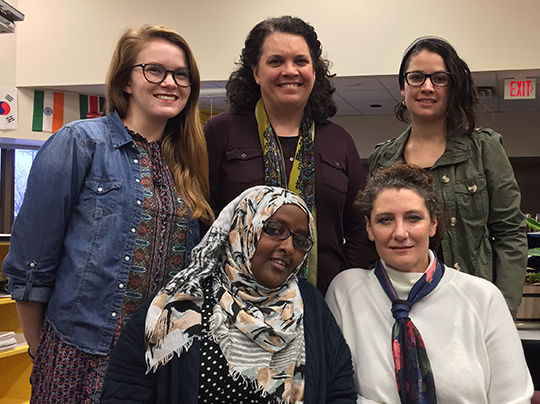Resources
Office for Equity and Diversity OED's mission is to increase access to higher education by advocating for members of our community and emphasizing the importance of diversity in promoting learning and development at the University of Minnesota. Our commitment to equity and diversity is the shared responsibility of students, staff, and faculty, and must be supported and guided by all levels of leadership.
Disability Resource Center ensures that students, faculty and staff have access to all the University has to offer and equal opportunities to participate in the many interesting activities on campus. Their goal is to ensure that you have access to all the learning opportunities you choose, whether in class or at work, or participating in the wide range of social and cultural experiences the University offers.
Community of Scholars Program Based in the Graduate School Diversity Office, the Community of Scholars Program (COSP) works towards creating an institutional environment that supports the academic and professional success of Native American graduate students and domestic graduate students of color who are underrepresented in academia.
Equity and Diversity Certificate Program The Equity and Diversity Certificate helps participants develop tools necessary for advancing equity and diversity in all aspects of their personal and professional lives. It’s free of charge and open to students, faculty, and staff on all campuses of the University of Minnesota.
MNLEND Commitment to Diversity
Disability is non-discriminate and occurs among people from all walks of life. MNLEND values the diverse identities and experiences found among the wider disability community.
Including underrepresented voices in the active discussion of promising practices, research, personal experiences, and policy is an essential part of MNLEND's training mission.
MNLEND actively recruits, trains, and supports Fellows who often come from under-represented racial, ethnic, socioeconomic, religious, gendered, educational and disability backgrounds.
Participants from all walks of life in MNLEND helps not only to build empathy for each other across differences, but also serves to develop excellence in inclusive and collaborative neurodevelopmental disabilities leadership.

MNLEND Diversity in Numbers
2023-24: Of 29 Fellows, 62% of all MNLEND Fellows were family members of individuals with a disability or identified as having a disability and 50% of all Fellows were from diverse racial/ethnic and linguistic backgrounds.
2022-23: Of 29 Fellows 55% of all MNLEND Fellows were family members of individuals with a disability or identified as having a disability and 55% of all Fellows were from diverse racial/ethnic and linguistic backgrounds.
2021-22: Of 29 Fellows 59% of all MNLEND Fellows were family members of individuals with a disability or identified as having a disability and 52% of all Fellows were from diverse racial/ethnic and linguistic backgrounds.
2020-21: Of 31 Fellows: 61% of all MNLEND Fellows were family members of individuals with a disability or identified as having a disability and 52% of all Fellows were from diverse racial/ethnic backgrounds.
2019-20: Of 29 Fellows: 41% of all MNLEND Fellows were family members of individuals with a disability or identified as having a disability and 52% of all Fellows were from diverse racial/ethnic backgrounds.
2018-19: Of 28 Fellows: 46% of all MNLEND Fellows were family members of individuals with a disability or identified as having a disability and 43% of all Fellows were from diverse racial/ethnic backgrounds.
2017-18: Of 33 Fellows: 52% of all MNLEND Fellows were family members of individuals with a disability or identified as having a disability and 33% of all Fellows were from diverse racial/ethnic backgrounds.
2016-17: Of 28 Fellows: 46% of all MNLEND Fellows were family members of individuals with a disability or identified as having a disability and 22% of all Fellows were from diverse racial/ethnic backgrounds.
2015-16: Of 22 Fellows: 45% of all MNLEND Fellows were family members of individuals with a disability or identified as having a disability and 32% of the community-based Fellows identified as being from diverse racial/ethnic backgrounds.
2014-15: Of 21 Fellows: 29% of all Fellows were family members of individuals with a disability or identified as having a disability and 38% of all Fellows came from underrepresented racial/ethnic backgrounds.
2013-14: Of 18 Fellows: 22% of all Fellows were family members of individuals with a disability or identified as having a disability and 38% of all Fellows came from underrepresented racial/ethnic backgrounds.
2012-13: Of 13 Fellows: 15% of all Fellows were family members of individuals with a disability or identified as having a disability and 39% of all Fellows came from underrepresented racial/ethnic backgrounds.
2011-12: Of 18 Fellows: 61% of all Fellows were family members of individuals with a disability or identified as having a disability and 39% of all Fellows came from underrepresented racial/ethnic backgrounds. LEND moved to ICI this year onward.
2010-11: Of 14 Fellows: 21% of all Fellows were family members of individuals with disabilities or identified as having a disability and 22% of all Fellows came from underrepresented racial/ethnic backgrounds. Housed in Pediatrics.
2009-10: Of 12 Fellows: 8% of all Fellows were family members of individuals with disabilities or identified as having a disability and 42% of all Fellows came from underrepresented racial/ethnic backgrounds. Housed in Pediatrics.






 FIND OUT HOW YOU CAN
FIND OUT HOW YOU CAN